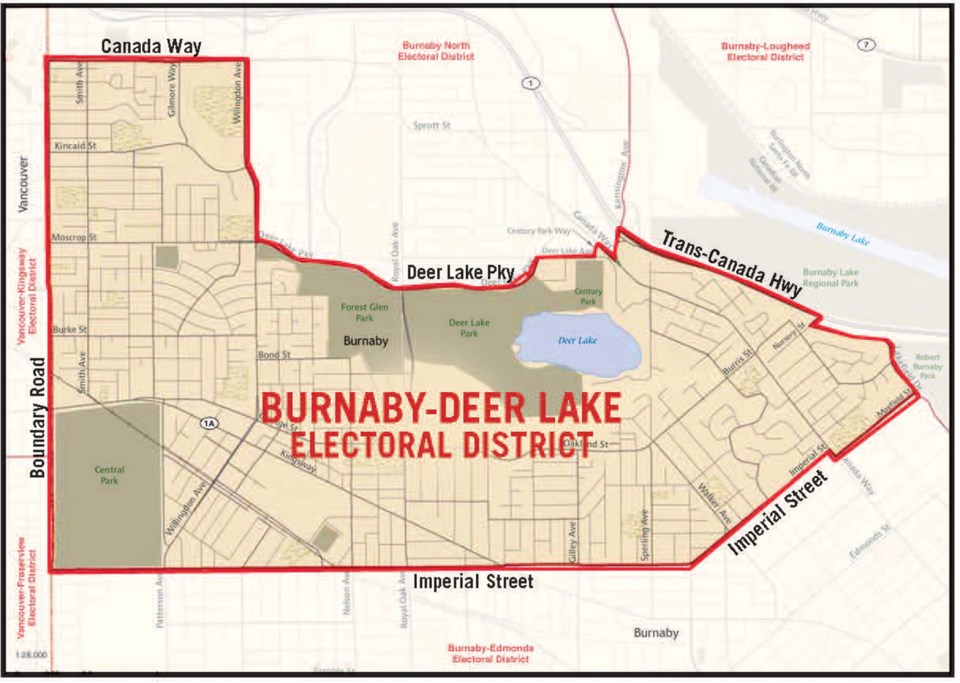BACKGROUND:
As with all the ridings in Burnaby, election watchers can expect an interesting race in Burnaby-Deer Lake. It’s been held by New Democrat MLA Kathy Corrigan since 2009, when she posted a 512-vote victory over Liberal incumbent John Nuraney (who held the previous riding of Burnaby-Willingdon before boundaries were redrawn). She increased her gap over the Liberals slightly in 2013.
At the same time, Green support has been small but growing, as Rick McGowan – who’s back on the ballot this time – increased the Green vote to 8.3 per cent in 2013 (up from 5.5 per cent in 2009).
DEMOGRAPHICS:
Not surprisingly to anyone who’s spent time in the area and experienced the wide diversity of stores and restaurants, Burnaby-Deer Lake is home to a multicultural, multilingual population.
According to 2011 census data, only about a third of its residents (18,820 of 55,075) claim English as their mother tongue. Almost as many – 17,005 – claim a Chinese language (7,090 Mandarin, 4,080 Cantonese and 5,835 other or unspecified). The rest represent a wide range of Asian and European languages, with a smattering of African. Other popular languages include Filipino (Tagalog), Korean, Spanish, Punjabi and Russian.
HOT ISSUES:
Housing, housing and housing. And did we mention housing?
In a riding where the vast majority of residents are living in some form of multi-family accommodation, housing is bound to be a hot-button issue. The 2011 census data shows that only 3,930 of the 22,645 occupied private dwellings are single-detached homes; the rest are spread out between apartments, semi-detached homes, duplexes and row houses, with by far the largest number (14,460) in apartments. Given the rapid pace of development in the past few years, chances are the next census will show even higher numbers than that.
Burnaby-Deer Lake has been at the heart of Burnaby’s “demoviction” controversy as affordable apartment buildings around Metrotown are being torn down to make way for new (and often luxuriously priced) highrise condos. While the city moves ahead with plans to turn Metrotown into the latest and greatest “downtown” neighbourhood in the region, a battle is being fought on the ground between those who want to draw new people to the area and those who want to save it for the folks who already live here.
We can’t think of a single issue that has so galvanized residents and so divided a community. Candidates will have to decide whether it’s best to sell voters on progress or whether they want to be seen as advocates for the vulnerable – or whether they’re willing to walk that dangerous tightrope right down the middle.
WHAT TO EXPECT:
It’s a new race this time out, with Corrigan retiring and her place being taken by Burnaby city councillor (and elementary school music teacher) Anne Kang. Kang is facing down Liberal Karen Wang, a businesswoman who runs three daycare centres in Burnaby.
Which one of these two fresh female faces can win will depend, as always, on who can get the vote out – and history shows that may be an uphill climb in this riding. Burnaby-Deer Lake’s existence has been characterized by lousy voter turnout, with only 48 per cent of registered voters casting a ballot last time (following similar numbers in 2009).
An analysis of the poll-by-poll breakdown from 2013 shows some very polarized voting patterns in the riding. Not surprisingly, Liberal strength is clustered around some of the more upmarket housing areas – think Deer Lake and Buckingham Heights – and many of the areas around Metrotown where highrises abound.
The NDP, meanwhile, has typically laid claim to the older, family-focused residential areas around Burnaby Hospital, BCIT and Moscrop, plus the affordable multi-family areas behind Metropolis at Metrotown.
Those latter areas, however, are changing fast. Will new residents who have come into highrises in the area since 2013 be more likely to vote Liberal? Have a significant number of former NDP supporters already been driven out of the riding? Will those who live in those more transient rental areas – with a higher proportion of newcomers and potentially vulnerable populations – even vote?
And will voters in the rest of the riding – where results at many polls have been separated by a handful of votes either way – turn out in large numbers or just stay home?
Plus, there’s always the wild card factor: Assuming McGowan can build on his numbers from last time, will Green support play any role at all in the final outcome? And can independent candidate Elias Ishak garner enough support to throw a wrench into the plans of either frontrunner?
One thing we know for sure: She who wins will be she who can motivate her people and get them to the polls.
OUR PREDICTION?
Kang’s public profile gives her an obvious edge, and she also benefits from the strength of the party machine that has powered so many successful election campaigns at all three levels of government in Burnaby.
The NDP can’t afford to lose this riding if it hopes to form the next government, so we’re betting they’re going to fight hard to keep it.
The B.C. Liberals don’t need the riding as badly as the NDP do, but they’d be happy enough to take it away if they could. A strong Liberal wave could help them, if one develops between now and Election Day.
In the meantime, we’ll call this one Kang’s to lose.
– With demographic statistics compiled by Mike Xue



![[UPDATE] Burnaby votes 2017](https://www.vmcdn.ca/f/files/glaciermedia/import/lmp-all/1023394-Election-Raj-Kennedy.jpg;w=120;h=80;mode=crop)